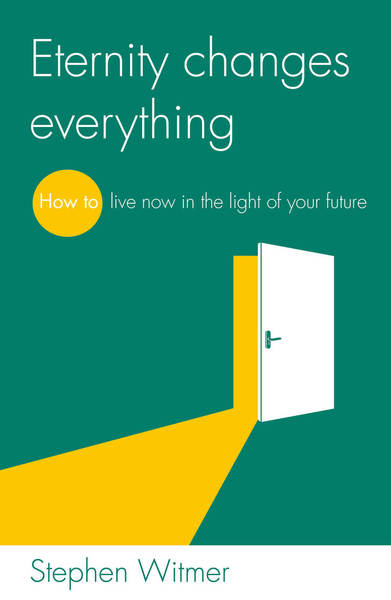
This week we are launching the latest title in our "How to ... " series: Eternity Changes Everything. Here's a sneak peak extract to whet your appetite ...
In early 2004, I met a young lady named Emma Hutchinson and promptly fell in love with her. I knew within a couple weeks that this was the girl I wanted to marry and grow old with.
There was just one problem: she was nowhere near so sure! Thankfully, my dogged persistence paid off, and we eventually started dating. As time went on, I became more and more sure that Emma would be an amazing wife—but not nearly so sure that she would actually ever be my wife. So, when, 18 months after we met, I got down on two knees to propose to Emma (yes, I know it’s supposed to be one knee, but I was really nervous) and she said yes, my world changed. We weren’t married yet, but now—at last!—I knew that we would be.
I noticed two things about myself in the weeks after our engagement. First, seeing Emma wearing her engagement ring made me less satisfied with my single life. I was no longer blissfully content eating large quantities of microwave meals while watching movies by myself. My personal hygiene began to improve markedly. All my plans for the coming year now included another person. I looked for housing for two, not for one; I drew up a budget for two, not one. I was looking forward to marriage, leaning toward it, planning for it… because I was confident I would soon be married. My future kept pressing into my present. Though I wasn’t yet a married man, I was beginning to live like one.
But, oddly enough, at the very same time I was patient. Because I knew Emma would say “I do” at our wedding, I didn’t feel the need constantly to check she still loved me and would go through with the marriage. I never considered pushing the wedding to an earlier date before she could change her mind. When I experienced sexual temptation, I would fight it by reminding myself that very soon we would be married: “I don’t need this. I can wait.”
Confidence about my married future was simultaneously creating restlessness and patience in my present.
The Christian’s confidence about their future—that it is wonderful, and that it is certain—has exactly the same paradoxical effect. It produces two impulses within us that we might think wouldn’t fit together—it makes us restless and patient for the new creation at the very same time. This is what Paul is explaining in Romans 8:
We ourselves, who have the firstfruits of the Spirit, groan inwardly as we wait eagerly for our adoption to sonship, the redemption of our bodies. For in this hope we were saved. But hope that is seen is no hope at all. Who hopes for what they already have? But if we hope for what we do not yet have, we wait for it patiently. (8 v 23-25)
Paul refers to future-oriented Christian confidence as “hope”: “For in this hope we were saved.” We often use the word hope to mean “wish.” When hope = wish, hope becomes a very flimsy word, because very often we don’t get what we wish for. “I hope they don’t serve mushrooms… but they have.” “I hope they don’t see the mushrooms I’ve hidden in my napkin… but they have.” The Bible sees “hope” very differently; it is not flimsy, but certain. It is rooted in God’s character even though it stretches toward something that hasn’t yet happened.
Christian hope is the cast-iron confidence that God will recreate the whole world and will get us there to enjoy it: a new me in a new world. And Paul identifies the twin results of that hope in the verses on either side.
First, Christians “groan inwardly as we wait eagerly for our adoption to sonship, the redemption of our bodies” (v 23). Have you ever wanted something so much (a cold drink on a hot day, a hot shower on a cold day, something sweet during a diet) that you actually groaned for it? Groaning for something means you really, really want it. So, that inward groaning and eager waiting is restlessness. We’re not satisfied with this imperfect present, precisely because we’re certain of a perfect future.
Second, the strong confidence of a Christian also produces patience: “But if we hope for what we do not yet have, we wait for it patiently” (v 25). We know that we don’t have the life we long for; but we also know that we will one day. We don’t need to rush it. We don’t want to turn away from it. That’s patience.
The central point of this book is that Christians are meant to live, and can live, in a healthy, exhilarating, joyful, productive, frustrating, painful, challenging tension between restlessness and patience. We’ll see and serve the world in new ways. Our walk will be challenging, but also the thrill of a lifetime.